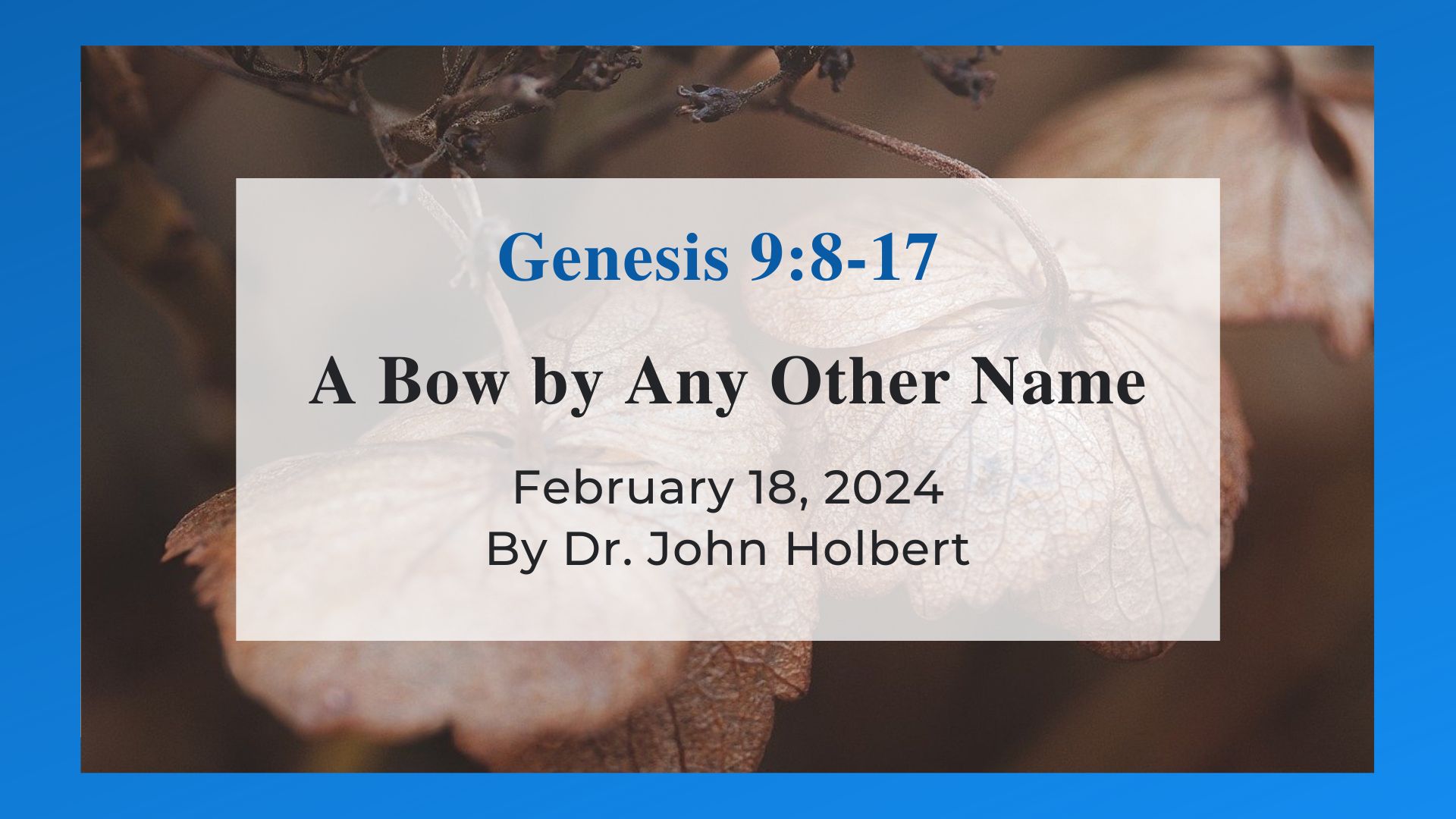A Bow by Any Other Name - Reflections on Genesis 9:8-17
by Dr. John Holbert on Monday, February 12, 2024

A Bow by Any Other Name
Genesis 9:8-17
The Peripatetic Hebrew Bible Preacher
As we enter once again the season of Lent, we would do well to reflect on the relationship that God has to the world that God created. When we practice our prayer and meditation during this generally contemplative time in the church year, just what sort of God is it that we are contacting? The Hebrew Bible spends a good part of its time on the possible answers to that question. Indeed, one of the great difficulties that modern Christians often have with the First Testament is the different kinds of answers one finds to the question in the diverse pages of the Hebrew Bible. It is often imagined that the simple answer to that question about God’s nature is “love,” as it is manifested in the life, death, and resurrection of God’s son, Jesus of Nazareth. Though I would suggest that that answer is perhaps overly simple, less nuanced than it should be, the fact is clear that in the pages of the Hebrew Bible, God is portrayed in an almost bewildering array of diverse pictures.
Genesis 9 offers one such portrayal, a rather more sophisticated one that a cursory reading of the text might overlook. To be sure, the text has often been seen as a simple depiction of one of nature’s most colorful and unforgettable displays—the magnificent rainbow after the rain, and there can be little doubt that the word used here may well mean precisely that. That word, qesheth in Hebrew, is however one used more commonly for an instrument of war, the bow and its accompanying arrows. In reality, a translation of that word as “rainbow” is only obvious in the book of Ezekiel where God’s wonderous presence, seated above the dome of the sky, is said to be “like the bow in a cloud on a rainy day” (Ez.1:28), employing that Hebrew word. But among the nearly 70 other uses of the word, it is clear that the war weapon is meant.
Hence, might it well have that other meaning here in Genesis? YHWH, after the horrors and destruction of the massive flood, now “sets (places) my bow in the clouds, and it shall be a sign of the covenant between me and the earth” (Gen.9:13). I do not deny that the rainbow image is certainly part of the scene and that its appearance in the sky after rain is a living witness to YHWH’s promise never again to destroy the earth as has just occurred. In one of the delightful facts of this text, the bow in the clouds is not primarily for our assurance that God has promised us eternal protection from future cataclysm but rather is a kind of string tied around YHWH’s finger to remind YHWH not to act in that terrible fashion again. Over and again the text tells us that the bow is for God’s remembrance. “I will remember” (vs.15); “I will see it and remember” (vs.16). You and I can look at it if we wish (and I readily admit that I never see a rainbow without thinking of this text), but it is placed in the clouds so that God will not forget.
But if the bow may also mean the bow of war, an image that divine figures throughout the ancient Near East portray, from Egypt to Mesopotamia, what might that add to our appreciation of the image? YHWH has quite literally hung the divine weapon in the sky in such a way that no arrow may again be launched against the earth. The war bow is placed so that its use as a weapon against the earth is no longer possible. After all, the bow is pointed outward, away from any earthly target. In other passages in the Hebrew Bible, the weapons of war will be burned (Hosea) or destroyed (Jeremiah); here in Gen.9, the ancient author prefigures those later promises for an end to war and destruction.
Hence, whether we see here a rainbow or a war bow, in either case, it becomes a magnificent sign of the end of the conflict, a conviction that God will never again engage in combat against God’s creation, and by implication neither should we, God’s creatures, engage in such fury. We do well to remember these old tales as we humans seem incapable of forgoing the desire to attack and kill our human siblings in ways and places too numerous to count.
YHWH has vowed never again to employ fierce divine anger against that which God created, becoming thereby a God who finally refuses to hate and destroy any creatures (see Hosea 11 for a glorious reiteration of that pledge). Unfortunately, that promise in no way precludes us from employing our own fierce anger against those with whom we disagree and hate and reject. God’s rainbow, God’s war bow, now hangs in the clouds. When will we hang up our own weapons, beating them at last into plows and fruit hooks?
